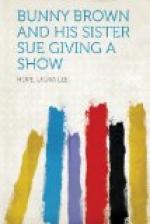“No, I won’t get in the trough again,” said Bunny. “I only did it now to see if I’d fit. And I don’t—very well,” he added.
Then Mart told Bunny, Sue, and the others something about how a stage in a theater is set, and something about the proper way to come on and go off. A little later Lucile also came out to the garage and she drilled the girls in a little dance they were to give.
Then the two young performers showed the others how the stage scenery was set up to look as real as possible from the front.
“Where are you going to give your play?” asked Mart, as they all sat down to rest.
“Oh, we don’t know, yet,” said Bunny. “I guess we won’t have it until around Christmas, and by then my father will think up some place for us.”
“Couldn’t we have it up here?” asked Sadie West. “All the scenery is here.”
“Oh, there isn’t room,” said Lucile. “We have to have a stage, and then there is no place up here for the audience to sit. And there isn’t any use in giving a play unless you have an audience. That’s half the fun. What are you going to do with all the money you make, Bunny Brown?” she asked the little chap.
“Oh, I—I guess we’ll give it to mother’s Red Cross,” he answered. “But first we’ve got to find out what sort of acts we can give. Our dog Splash is a good actor—he was in our circus.”
“I guess Mr. Treadwell can work Splash into the play in some way,” said Mart. “We’ll ask him.”
That afternoon the actor gathered the children around him, out in the loft over the garage, and, by questioning them, he found out what each one could do best. Some could recite little verses, others could sing and some could dance.
“Can’t I have my trained white mice in the play?” asked Will Laydon. “They twirl around on a wire wheel and one of ’em stands up on his hind legs.”
“Well, perhaps we can use them,” said the actor. “Now I’ll tell you a little about the play I am going to write for you. It will be in three acts. One act will be in the meadow, as we have the scenery for that and must use what we have. Another act will be in the barnyard, and we can use as many animals there as we can get. Then we’ll have the last act in the orchard, and you children can be in swings, in the trees, or playing around.”
“We’ve got only one tree and not many of us can get in that,” objected Charlie Star.
“Well, perhaps I can rig up another tree—or something that will do,” said Mr. Treadwell. “We’ll decide about that later. Now as to the play. I thought I’d have it very simple. It’s about an old man and two children who have lived in the city all their lives. They are in the show business and they get tired of it. One day while traveling about they miss their train, and they are left in a lonely country town.
“At first they don’t like it, but when they see how quiet and peaceful it is, after the hot, noisy city, they decide to stay. They reach a farmhouse and find some children who are tired of the country and want to go to the city. The old man and the city children tell the country children about how hot it is in town, and advise them to stay in the fields and meadows.




